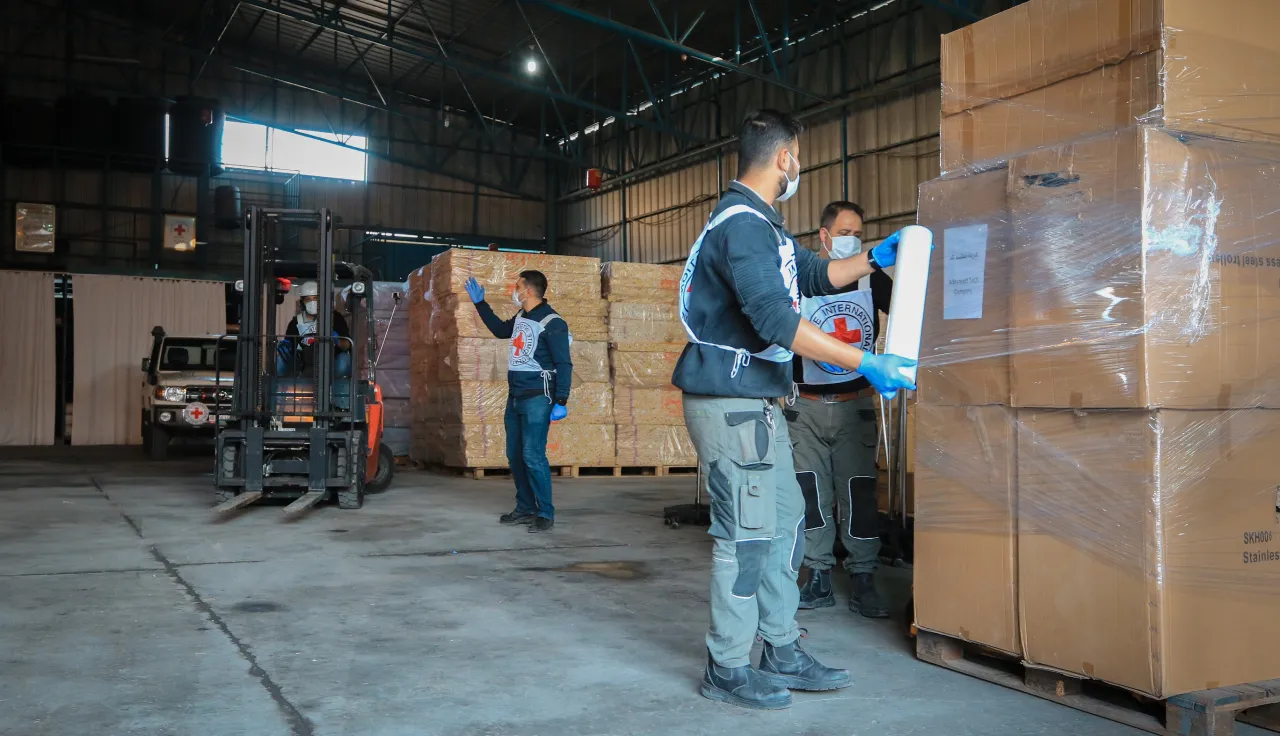All in this together: How we’re responding to COVID-19 in ILOT

In Israel, the West Bank and Gaza, we’re working hard to ensure we retain our operational capability to respond to developments in the conflict and the pandemic. Restrictions on movement and the threat of the rapidly spreading coronavirus disease (COVID-19) are making this more difficult, but they are challenges we are determined to overcome.
The COVID-19 pandemic has turned the world on its head. The ICRC’s core mission of protecting and assisting people affected by armed conflict has not changed, but as a humanitarian organization, responding to the crisis has become a priority for the ICRC across the globe.
In Israel, the West Bank and Gaza, we’re working hard to ensure we retain our operational capability to respond to developments in the conflict, as well as the pandemic. Restrictions on movement and the threat of the rapidly spreading virus are making this more difficult, but they are challenges we are determined to overcome.
A crucial part of what we do remains our work on behalf of people in places of detention. Unfortunately, our family visit program has been suspended in order to prevent the spread of the virus to places of detention. We understand the challenge the outbreak poses to detaining authorities and are working to ensure that alternative means of contact are offered to detainees and their families.
At the same time, our work to ensure the welfare of people deprived of their freedom continues. The ICRC is in close contact with the detaining authorities and despite various constraints resulting from the current pandemic, the ICRC’s visits to places of detention in Israel, the West Bank, and Gaza will continue, albeit with special precautions to protect the detainee population.
Helping to combat COVID-19 in the places where we're active has also become a priority. The weakness of the healthcare system in Gaza, in particular, makes its population highly vulnerable to any widespread outbreak of the virus, so we're working to ensure that Gazan hospitals are better equipped to cope. In April, we delivered patient monitors, defibrillators, electrocardiogram machines, oxygen flow meters, suction devices, a ventilator, and other vital equipment for the intensive care units in Gaza, and we are working on bringing in more. We're also constructing an infection control facility in the European Gaza Hospital that will help keep staff and patients safe.
But we’re not alone in the struggle against COVID-19. As the founding institution of the Red Cross Red Crescent Movement, we’re standing shoulder to shoulder with our partner organizations Magen David Adom (MDA) and the Palestine Red Crescent Society.
MDA has launched its largest operation ever, setting up a special hotline to respond to deluges of enquiries from people who believe they might have been exposed to the virus. MDA volunteers are also heading out to people’s homes to collect swab samples from people who may have been infected. Experience around the world is showing that testing is key to fighting COVID-19.
The Palestine Red Crescent Society, meanwhile, runs the ambulance dispatch call center for the Palestinian territory and is channeling calls from people who think they may have been exposed to the Palestinian Ministry of Health. We’re supporting the PRCS however we can, including by donating essential supplies needed to respond to the outbreak and supporting its communications efforts. So far we've donated 150,000 masks to the PRCS, as well as detergent wipes, gowns, boots, and other vital equipment.
We asked Palestinian Arab Idol superstar @MohammedAssaf89 to take on the @WHO's #SafeHands challenge—and he kindly agreed!
It's essential that we all learn to wash our hands properly to help in the fight to bring #COVID19 under control.
Thanks Mohammed! pic.twitter.com/Zn2lghQQsj— ICRC in Israel & OT (@ICRC_ilot) March 22, 2020
Information is a key part of this fight, and both National Societies are working hard to keep Israelis and Palestinians informed on how to keep themselves, their families and their communities safe from infection through public messaging. We’re doing what we can to amplify these vital messages whenever we can.

The fight is closer to the beginning than the end, but we are in it for the long haul, and our commitment to fulfilling our mandate in Israel and the occupied territories has not wavered.



